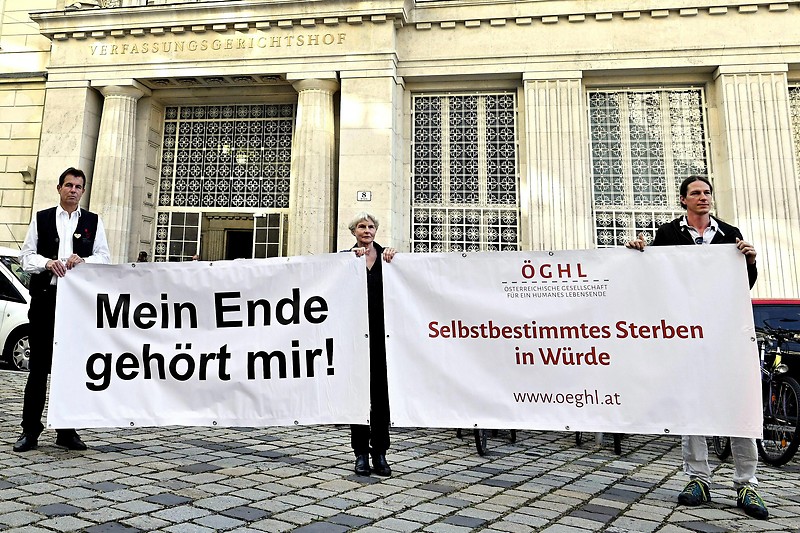On September 24th, the Constitutional Court in Austria held a public hearing on the prohibition of participation in suicide. According to the Austrian lawyer who brought the case to court, the prohibition is against the Austrian constitution, and also against European law.

A few activists and interested parties gathered in front of the court on Freyung in Vienna.
Government View
The ban was defended during the negotiations by government representatives, including the head of the constitutional service in the Chancellery, Albert Posch, and the heads of the justice section Georg Kathrein and Christian Pilnacek. “We have sufficient opportunities to ensure dignified dying on our palliative care units and other wards,” said the palliative care specialist Herbert Watzke at the hearing. It is already possible to refuse treatment – for example, to refuse antibiotics in the event of an additional infectious disease. “Virtually all patients with advanced diseases are prone to infections. You can use this opportunity to leave life in a dignified manner with our care.”
Patient view
Nikola Göttling, herself suffering from multiple sclerosis and one of the persons providing information to the Court for the applicants, did not want to accept this. “There are back doors, that’s right,” she said. “All I have to do is get an infection, then go to the hospital and refuse treatment.” But her legs are already paralyzed, and if the paralysis affects her arms in the next few years, she will have to be swaddled and fed. She therefore doesn’t want a “back door”, but the opportunity to die “because my life is degrading”.
Role of our member organisations
Our Swiss member organisation DIGNITAS – To live with dignity – to die with dignity (in short: DIGNITAS), was the initiator of this process. In 2019, DIGNITAS asked Austrian lawyer Dr. Wolfram Proksch to bring an action before the Austrian Constitutional Court. The purpose of that procedure was to review the constitutionality of the existing criminal law provisions regarding suicide assistance and voluntary euthanasia in Austria. During the hearing this month, representatives from both DIGNITAS (read their press release) as well as the Austrian Society for a Humane End of Life, ÖGHL, were there. DIGNITAS was physically present in the Court room and provided information to the 14 judges. ÖGHL representative Wolfgang Obermüller was not given access to the Court room, but still got into the city centre. For years he has been campaigning for the lifting of the voluntary euthanasia ban within the framework of the Austrian Society for a Human End of Life (ÖGHL). The “conditions like in the Middle Ages” in the country are “unacceptable,” said Obermüller to ORF.at. “The state must start to respect the self-determination of every person”, he said. His petition for a legal right to professional euthanasia is the largest in the German-speaking world. He advocates voluntary euthanasia as well as assistance in suicide. The corresponding laws showed the great need for reform, both in content and form, said Obermüller. (Source: https://orf.at/stories/3182617/)
Background and follow-up
According to the Austrian Criminal Code, voluntary euthanasia (Section 77) and participation in suicide (Section 78) are criminal acts. Both are punishable by imprisonment of up to five years. This Court Hearing was dealing with Section 78 (participation in suicide) only, as Austria knows one of the most rigorous systems against suicide assistance. This Section originates from the time of Austrofascism or the authoritarian corporate state (“Ständestaat”), which also explains the religious word “self-slaughter” instead of “suicide”. The prohibition covers even minor acts of support such as buying a train ticket abroad to help other citizens to perform suicide abroad. Even if the support is provided by close relatives, spouses, partners or other close people. The high-level bioethics commission at the Federal Chancellery therefore calls for a reform of the criminal offense as early as 2015.
In 2019, Dr. Proksch submitted four individual applications at the Austrian Constitutional Court (VfGH) about the criminal character of Section 77 and Section 78. Last June the case was the subject of deliberations by the Constitutional Court. After the public hearing this September, the Court of Justice will continue its deliberations in its October session. If necessary, the Court of Justice will schedule a further hearing. The date for the announcement of the decision will be announced later.

 Austria
Austria